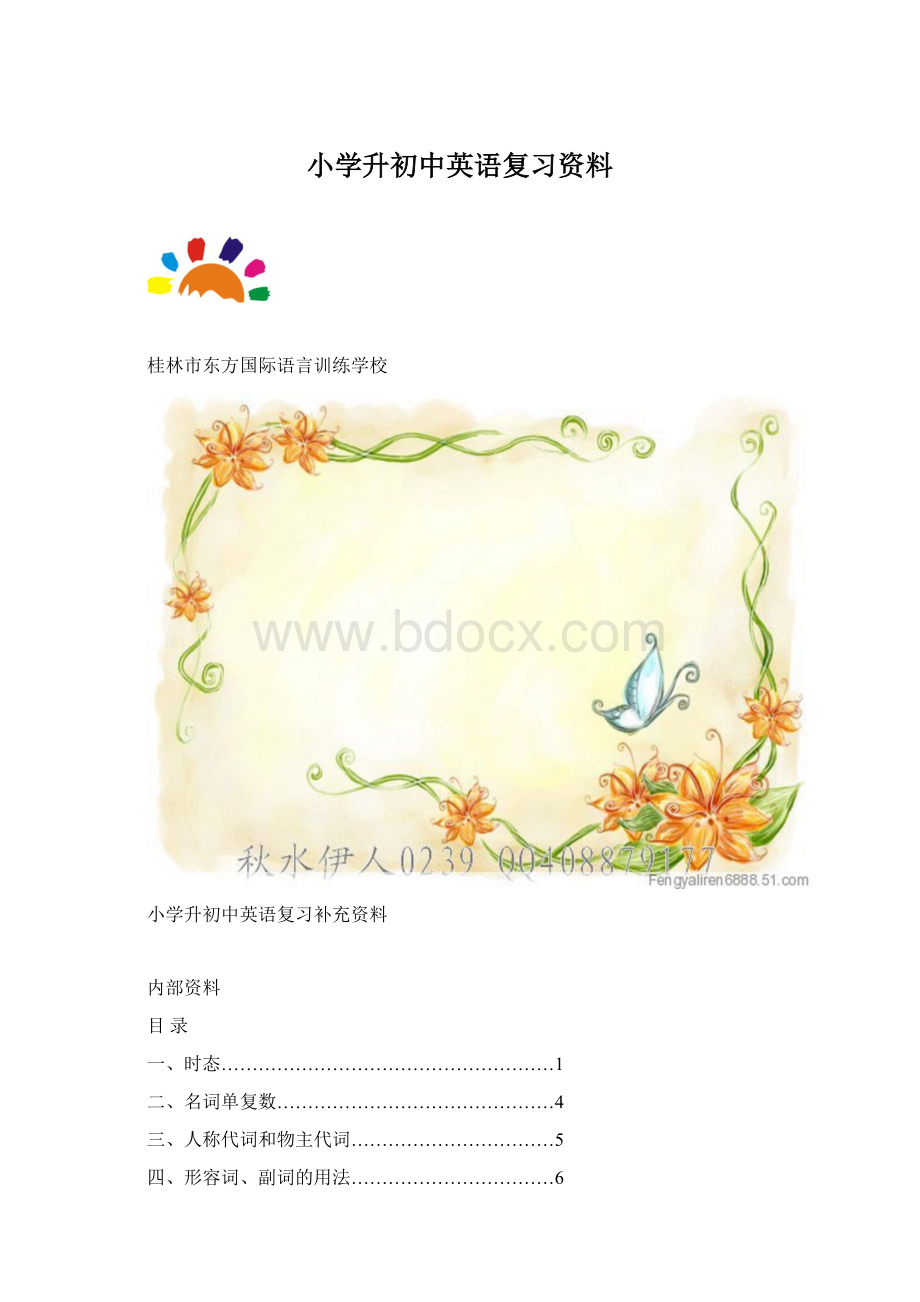小学升初中英语复习资料.docx
《小学升初中英语复习资料.docx》由会员分享,可在线阅读,更多相关《小学升初中英语复习资料.docx(19页珍藏版)》请在冰豆网上搜索。

小学升初中英语复习资料
桂林市东方国际语言训练学校
小学升初中英语复习补充资料
内部资料
目录
一、时态………………………………………………1
二、名词单复数………………………………………4
三、人称代词和物主代词……………………………5
四、形容词、副词的用法……………………………6
五、句子结构…………………………………………7
六、句型转换…………………………………………8
七、基数词、序数词…………………………………11
八、表示频率的单词…………………………………11
九、总练习……………………………………………12
一、时态
时态
功能
动词形式
变化规则
时间状语
例句
过
去
时
表示过去发生
的动作
动词-ed例如:
worked
①一般情况直接在动词词尾加ed如:
play—played
②以不发音的e结尾的动词直接加d。
如:
hope—hoped
③以辅音字母加y结尾的动词,变y为i,再加ed.如:
cry—cried
④以一个辅音字母结尾的重读闭音节,双写最后一个字母,再加ed。
如:
stop—stopped
⑤不规则变化单词,需要记忆。
如:
do---did,have---had
yesterday
twodaysago
justnow
lastweek
thedaybeforeyesterday
(1)Iplayedfootballyesterday.
(2)Iwaitedforyouforalongtimetwodaysagointhepark.
(3)Theboycriedforthecandyjustnow.
(4)Idroppedacointhismorning.
(5)Ididthehomeworkthedaybeforeyesterday.
补充练习:
按动词的适当形式填空。
1.He_________(go)outtenminutesago.
2.They_________(be)intheroomlastnight.
3.Mary___________(live)hereyesterday
4.He___________(have)lunchwithusjustnow.
时态
功能
动词形式
变化规则
时间状态
例句
一
般
现
在
时
1.表示目前状态
2.表示一个真理
3.表示经常﹑习惯、
重复的动作
第三人称单数作主语时
动词要变第三人称单
数形式即work→works
(1)一般情况下,直接加s.如:
play—plays
(2)以o,s,x,ch,sh结尾的词加es,如:
watch—watches
(3)以辅音字母加y结尾的词,变y为i再加es.如:
carry-carries
(4)特殊情况,特殊记忆。
如:
have-has,do-does
everyday
sometimes
never
always
often
usually
(1)Mybrotherplayscomputereveryday.
(2)ShewatchesTVsometimes.
(3)Hecarriestheheavysuitcasetothebusstation.
(4)Myfatherusuallyhasbreakfastat8o’clock.
1.Mybrother________(do)morningexerciseeveryday.
2.She_________(wash)clothessometimes.
3.Iusually_______(go)toschoolbybus.
4.Theyoften__________(get)upatsix.
5.Mymotheralways__________(have)breakfastatseven.
时态
功能
动词形式
变化规则
时间状态
例句
现
在
进
行
时
表示说话时正在进行的动作
be+动词-ing
(1)一般直接在动词词尾加ing.如:
eat—eating
(2)以不发音的e词尾的动词,去掉e,再加ing,如live—living、
(3)动词以重读闭音节结尾,也就是最后三位字母是“辅音+元音+辅音”,一般应先双写最后一个辅音字母,再加ing,如:
run—running
now
look
listen
(1)Sheiseatinganorange.
(2)Iamplayingthepiano.
(3)Heisrunningwithhis
doginthepark.
补充练习:
按动词的适当形式填空。
1.Listen,thechildren________________(read)intheclassroom.
2.Look,MissZhang_______________(have)anEnglishlesson.
3.She_________________(help)herbrotherwithhislessonnow.
时态
功能
动词形式
变化规则
时间状态
例句
将
来
时
表示将要发生的动作
Will/Shall+动词原形(Shall用于主语是I,we)
ShallI……..
Willyou……
表示邀请,请求willnot=won’tshallnot=shan’t
next
tomorrow
inthefuture
thisafternoon
soon
intwoweeks…
(1)ShallIvisityoutomorrow?
(2)Willyoustudyabroadinthefuture?
1.Tomorrowwe__________(leave)forShanghai.
2.We_______________(arrive)inBeijingnextMonday.
3.I____________(visit)myfriendinGuilinthedayaftertomorrow.
时态
功能
动词形式
变化规则
时间状态
例句
过
去
进
行
时
发生的动作在过去的某时间进行着
were/was+V-ing
如:
were/wasworking
①一般直接在动词词尾加ing.如:
eat—eating
②以不发音的e词尾的动词,去掉e,再加ing,如live—living
③动词以重读闭音节结尾,也就是最后三位字母是“辅音+元音+辅音”,一般应先双写最后一个辅音字母,再加ing,如:
run—running
When…,she…atthattime
(1)HewaseatinganapplewhenIcamein.
(2)ShewaslivinginShanghaiwithhergrandparents.
(3)HewasrunningacrosstheroadwhenIsawhim.
综合练习:
1.Howareyou(do)?
2.Look,Jone(sing)asong.
3.Heusually(drink)coffeebuttodayhe(drink)tea.
4.Tom(draw)verywell.
5.Thisshop(close)downnextweek.
6.I(notgo)toworkbycareveryday.
7.Don’tspeak(loud)!
8.He(walk)toschooleveryday.
9.Mymother(walk)intheschoolnow.
10.(notclose)thewindowplease.
11.She(help)hisbrotherwithhislessonsnow.
12.Hisparents(work)inashopsixyearsago.
13.He(have)breakfastwithhisfamilyjustnow.
14.WhenI(arrive)she(have)lunch.
15.Hemustbe(water)thegardennow.
16.Whyyou(notinvite)mein?
17.Manytrees(fall)downinthetyphoon.
18.ThisisJim(speak).
19.Myhobbyis(collect)stamps.
20.Shecouldn’thelp(smile)atthewords.
21.Theywill(take)photostomorrow.
22.They(be)intheroomlastnight.
23.Petergotuplaterand(ride)toschoolthismorning.
24.yoursister(teach)Englishlastyear?
25.Wouldyoulike(come)withme?
26.Heiscleverat(learn)language.
27.I(notwatch)TVlastnight.
二、名词单复数
变化规则:
(1)多数名词直接在词尾加s.如:
map---maps
(2)以字母s,x,ch,sh结尾的和以辅音字母加o结尾的有生命的名词加es.如:
fox---foxes,hero---heroes,tomato-tomatoes,potato-potatoes
(3)以辅音字母加y结尾的名词,变y为i,再加es,如:
factory---factories,library-libraries,
(4)以字母f或fe结尾的名词,将f或fe改为v,再加es.如:
leaf—leaves
(5)还有部分单词单复数形式相同。
如:
deer---deer,sheep-sheep,fish-fish
(6)另外还有些不规则变化的名词复数形式,需要记忆。
如:
child-children
必背的名词单复数:
1.pen→pens
2.car→cars
3.bus→buses
4.box→boxes
5.watch→watches
6.dish→dishes
7.tomato→tomatoes
8.potato→potatoes
9.photo→photos
10.library→libraries
11.city→cities
12.baby→babies
13.factory→factories
14.leaf→leaves
15.family→families
16.mouse→mice
17.shelf→shelves
18.foot→feet
19.knife→knives
20.wolf→wolves
21.deer→deer
22.sheep→sheep
23.fish→fish
24.goose→geese
25.woman→women
26.man→men
27.ox→oxen
28.child→children
29.tooth→teeth
30.class→classes
补充练习:
选择最佳的答案
()1.Those_______aredancing.
A.girlB.manC.womenD.woman
()2.Thefarmerhastwenty_____.
A.sheepsB.horseC.deersD.sheep
()3.TheSmithshavefive_____.
A.girlB.boiesC.childrenD.childrens
()4.Thecathasfour_____.
A.footB.feetC.feetsD.foots
()5.Howmany_____arethereinyourfamily?
A.peopleB.manC.peoplesD.woman
三、人称代词和物主代词
人称代词
主格
I
you
he
she
it
we
they
宾格
me
you
him
her
it
us
them
物主代词
形容词性
my
your
his
her
its
our
their
名词性
mine
yours
his
hers
its
ours
theirs
用法:
1.主格用作主语,放在句首。
2.宾格用作宾语,放在句中或句末,在动词或介词之后做宾语。
3.形容词性物主代词后一定要跟名词,不能独立使用。
4.名词性物主代词后一定不能跟名词。
补充练习:
选出正确的单词完成句子。
1.----MayIuse________(your,yours)bike?
----Sorry.__________(My,Mine)isbroken,too.
2.Helikes________(my,mine)pen.Hedoesn’tlike______(her,hers).
3.Ourchairisbetterthan_________(they,theirs).
4.Iwillgivethepresentsto________(they,them).
5.Myfatheristalkingwith_______(me,I).
6._______(我们)buyapairofshoesfor_______(他).
7.Pleasepass_______(我们)theball.
四、形容词、副词的用法
1.副词+形容词例:
verytall
2.动词+副词例:
gohome;workhard;danceverywell;talkloudly
3.形容词+名词例:
beautifulgirl;tallbuilding;dangerousanimal
几个变化→
★形容词→副词例:
slow→slowly,happy→happily
★名词→形容词例:
interest→interesting,beauty→beautiful
★动词→动名词例:
swim→swimming,listen→listening
★形容词→名词例:
tired→tiredness,happy→happiness,good→goodness
补充练习:
1.Iseesomepeoplewalking(happy)onthesquare.
2.Be(care)!
3.Don’tspeak(loud)!
4.Sheisa(beauty)girl.
5.Mygrandmotheris(old)thanmymother.
6.Let’smakesome(snowman).
7.Youlookso(tired).Gotobed,please.
8.Theseare(child).
9.Jennycan(fly)akite,butDannycan’t.
10.Ilike(listen)totheradio.
11.Thewindowshuts(easy).
12.Doyouwantapieceof(bread)?
13.(thesmith)oftengooutforawalkintheevening.
14.Happy(teacher)Day!
15.Themenandwomenare(quick).Theywalk(quick).Butthechildrenare___________(slow).
Theywalk(slow).
五、句子结构
1.主+谓(不及物动词)例:
Hecries.
2.主+谓+状语例:
Theyaresleepingintheoffice.
3.主+谓(及物动词)+宾例:
Heisplayingfootball.
4.主+谓+宾+状例:
Heplaysfootballeveryday.
5.主+连系动词+表语(名词或形容词)例:
Hebecomesateacher.Thisshirtlooksnice.Sheisateacher.
连系动词还有smell,taste,seem等
补充练习:
(一)划分下列句子成分(用符号表示),主语=,
谓语,宾语﹋,表语﹌,状语△△△△
1.Tomisdrinkingabottleofpop.
2.IvisitedmyfriendinBeijing.
3.Itisaninterestingjob.
4.Jennyisdrawingapicturewithherpencil.
5.Jimhasbreakfastat7:
00.
6.BeijingisthecapitalcityofChina.
7.TomhelpedJanewithherlessonsjustnow.
8.Thegirlinthepictureismysister.
9.Youshouldkeepquietinlibrary.
10.Thewomanissingingbehindme.
(二)连词成句
1.write,I,read,English,and,can,in
.
2.would,I,said,get,doctor,soon,well,the
.
3.matter,is,you,what,the,with
?
4.like,for,walk,would,you,go,me,a,with,to
?
5.home,first,go,better,you’d
.
6.to,you,radio,listening,do,the,like
?
7.do,you,what,for,can,I
?
8.English,time,it’s,lesson,for
.
六、句型转换
A.陈述句改为一般疑问句的方法:
1.句中有be动词,am,is,are,was,were的把am,is,are,was,were调到句首,第一个字母大写。
例:
①Heisateacher.→Isheateacher?
肯定回答:
Yes,heis.否定回答:
No,heisn’t.
②Theyaredancing.→Aretheydancing?
肯定回答:
Yes,theyare.否定回答:
No,theyaren’t.
2.句中有助动词will,shall及情态动词can,may,must,should的,将助动词或情态动词调到句首:
例:
①ShewillgotoBeijingnextweek.→WillshegotoBeijingnextweek?
肯定回答:
Yes,shewill.否定回答:
No,shewon’t.
②Icanswim.→Canyouswim?
肯定回答:
Yes,Ican.否定回答:
No,Ican’t
3.若句中没有be动词和情态动词(shall,will,can,should,may)时,则考虑用do,does,did.
如果是过去时,一般疑问句为:
Did+主语+动词原形+其他?
例:
Mysisterwenttoschoolyesterday.→Didyoursistergotoschoolyesterday?
肯定回答:
Yes,shedid.否定回答:
No,shedidn’t.
②如果是一般现在时且主语是第三人称单数,一般疑问句为:
Does+主语+动词原形+其他?
例:
HewatchesTVeveryday.→DoeshewatchTVeveryday?
肯定回答:
Yes,hedoes.否定回答:
No,hedoesn’t.
③如果是一般现在时,主语不是第三人称单数,一般疑问句为:
Do+主语+动词原形+其他?
例:
TheyreadEnglisheverymorning.→DotheyreadEnglisheverymorning?
肯定回答:
Yes,theydo.否定回答:
No,theydon’t.
补充练习:
将下列句子改为一般疑问句,并做肯定、否定回答。
1.Theyaretall.
2.Thereisabookonthedesk.
3.Heoftengetsupatsix.
4.TheyreadEnglisheveryday.
5.Hesawamovielastnight.
6.Theydidtheirhomeworkyesterday.
B.特殊疑问句=疑问词+一般疑问句
疑问词包括:
whatwhenwherewhowhosewhichwhyhow
例:
1.MymothergoesshoppingonSunday.→WhogoesshoppingonSunday?
2.Thisismybook?
→Whosebookisthis?
3.Hegetsupatsix.→Whendoeshegetup?
4.Theyaredancingintheclass.→W